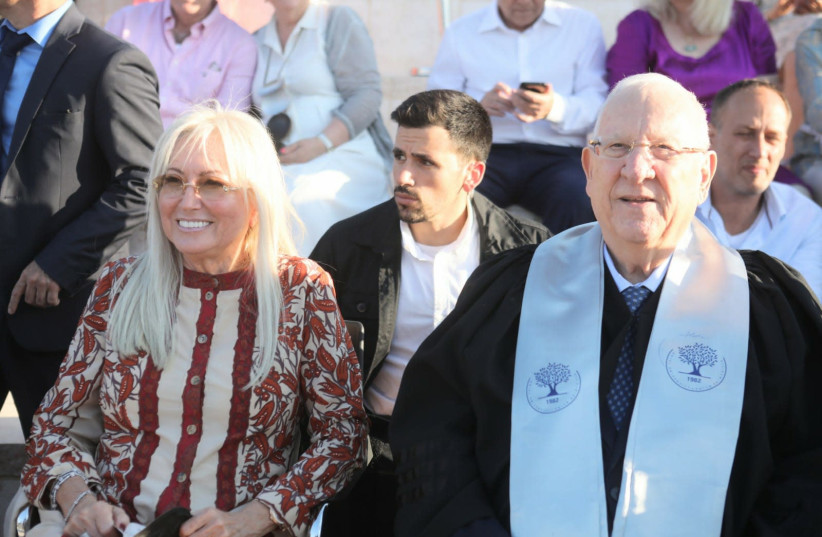The actor Noa Tishby has gone to bat for Israel on US college campuses as an official emissary of her home country. The philanthropist Miriam Adelson has underwritten multiple organizations dedicated to building pro-Israel sentiment in the United States.
And now both prominent advocates for Israel have publicly joined what is turning out to be a resounding chorus of criticism of Israel’s current government and its efforts to sap the country’s judiciary of its independence and power.
Shock among Israel supporters
“I will say it in the sharpest and clearest way: Diaspora Jewry and Israel’s supporters in the world are shocked. They are shocked,” Tishby said in a column published in Hebrew on Ynet Saturday. “With great pain they look and see how the country they fiercely defended — in Congress, in the media, on the networks or to foreign governments — is changing its face.”
“With great pain they look and see how the country they fiercely defended — in Congress, in the media, on the networks or to foreign governments — is changing its face.”
Noa Tishby
Tishby wrote that she had never publicly criticized “any step taken by any government” in more than two decades as a public figure, but that she was writing “the most difficult public text I have ever written” because Israelis need to understand that the judicial reform legislation, which she called “not a reform, but a coup,” brings their country out of step with other democracies and would threaten its national security and support abroad.
“It’s not like America. Not even a little,” Tishby wrote.
Writing in Israel Hayom, the right-wing Israeli newspaper founded by her late husband Sheldon, Adelson sidestepped the legislation itself and instead focused on its speedy advance.
“Regardless of the substance of the reforms, the government’s dash to ratify them is naturally suspect, raising questions about the root objectives and concern that this is a hasty, injudicious, and irresponsible move. A good deal is reached through cold-eyed circumspection,” wrote Adelson, who with Sheldon was first a funder of the pro-Israel lobby AIPAC and then supported the Israel American Council, where she was board chair. They have also been a leading funder of Birthright Israel. She later added, “Bad motivations never bring about good outcomes.”
“Bad motivations never bring about good outcomes.”
Miriam Adelson
The statements from Adelson and Tishby offer a clear sign that Israeli Prime Minister Benjamin Netanyahu cannot expect prominent allies abroad to back his right-wing government on its signature legislation. They join a chorus of figures who have in the past been notable for slapping down Jewish Diaspora criticism of Israel as unwarranted, among them the writers Yossi Klein Halevi, Matti Friedman and Daniel Gordis; the constitutional lawyer Alan Dershowitz; New York Times columnist Bret Stephens; and the former long-serving national director of the Anti-Defamation League, Abe Foxman.
Adelson and her husband were in the past major funders of the Zionist Organization of America, one of the handful of US Jewish bodies defending the new government’s planned reforms.
Protests within Israel entered their 10th week on Saturday night, with hundreds of thousands of people demonstrating not just in Tel Aviv, the country’s liberal center, but in cities across the country and even in Israeli settlements in the West Bank, where most voters are right wing.
Among those publicly condemning the legislation this week have been scores of Israeli military officials; the Jewish former head of the US Federal Reserve Ben Bernanke, who said the changes would cause “tremendous damage”; and about 150 people in Gush Etzion, a group of largely religious settlements that were a stronghold for the far-right Religious Zionist bloc in last year’s election.
בפעם החמישית ברציפות, 150 מפגינים בגוש עציון. ״גשר צר מאוד״ pic.twitter.com/YLrR862jVt
— Ben Caspit בן כספית (@BenCaspit) March 11, 2023
A core piece of the legislation advanced on Sunday, with a hearing in the Knesset, Israel’s parliament, on the provision giving the government power over appointing judges. The legislation’s proponents say reforms are needed because the judiciary is out of step with the sentiments of voters, while its broad coalition of critics at home and abroad say they would threaten Israel’s status as a democracy with checks and balances.
Israel’s president, Isaac Herzog, has called for compromise talks, and there are some signs that efforts to reach a compromise may be taking place behind closed doors. But Netanyahu’s far-right partners in his governing coalition have not indicated an appetite to slow down or otherwise change their approach.
One of those partners, Bezalel Smotrich of the Religious Zionist Party, is beginning his first US visit as a government minister. Few Jewish groups have agreed to meet with the finance minister, who also has authority over civilian life in parts of the West Bank, and protests are planned as he lands in Washington, DC, on Sunday.
Smotrich is speaking to Israel Bonds, which markets Israeli government bonds and works closely with his ministry, and an array of liberal Jewish groups have announced plans to picket the speech at a hotel in downtown Washington. Ahead of Smotrich’s speech, a group of leading investors in Israel will hold a press conference in the same hotel to outline what they say are the threats the reforms pose to Israel’s economy.
Arriving in Washington on Sunday, Smotrich said in a statement that his meetings would be focused on investment.
“I will meet, by the grace of God, with a range of investors and international economic players interested in deepening their investment in the state of Israel.”
Bezalel Smotrich
“I will meet, by the grace of God, with a range of investors and international economic players interested in deepening their investment in the state of Israel,” he said, although he did not name them.
“Ties with the Jewish Diaspora are important and I am coming with the message that, in Israel and in the Diaspora, differences of opinion and arguments among ourselves are permitted, but nothing will sunder our oneness,” he said. “We are stronger together.”

